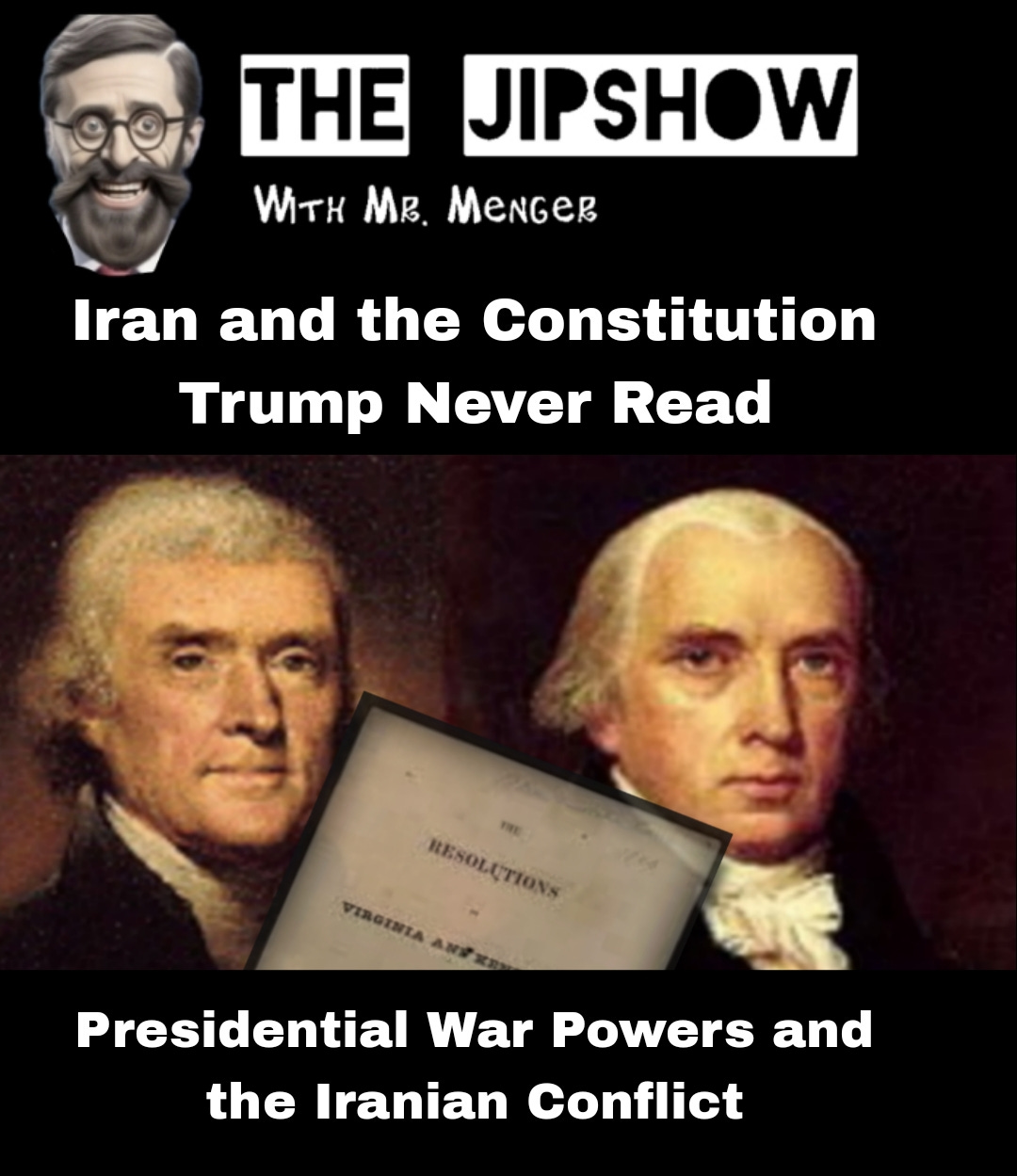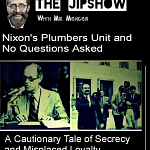Time Stamps:
Introduction (0:00)
The Chains of the Constitution (2:25)
Constitutional Chants (3:15)
Guarding Us Against War (6:29)
The Axis of America Second (15:34)
America First Completely Obliterates Itself (19:02)
Listener Correction on Dirty Days Episode (20:35)
[I]n questions of power… let no more be heard of confidence in man, but bind him down from mischief by the chains of the constitution."
- Thomas Jefferson
The news and social media feeds are filled with stories about the potential for regime change in Iran, and the unilateral destruction of nuclear sites. But before we say “mission accomplished,” the desire for regime change is an act of war.
And one that Benjamin Netanyahu would like to see.
But leaving aside foreign leaders, there's plenty to clear up at home.
Constitutional Chants
In common parlance, the phrase “Commander-in-Chief” is synonymous with the modern conception of the Presidency itself, as though one man was elected with the power to wage war without consulting anyone else in the matter.
But how does this actually follow from the framework of the Constitution as it was written, debated, and ratified into law?
The “short answer” is, it doesn't. But we must explain how.
But first, let us set the stage before confronting this controversy head on.
In contrast to the historical record we will consult stands a modern legal profession that is often shaped not by the original intent of the Constitution's framers, but by the historical justifications of various US Presidents who operated outside of the law in times of conflict.
This may be a shocking assertion to some, but let us consider for a moment how the “balance of powers” fails to temper political considerations as a priority.
Whether it's time to appoint a Supreme Court Justice or an FBI Director - or even to impeach the President - political considerations remain at the top of the hierarchy. This is second nature in a democratic government, although this phenomenon is hardly confined to democracy itself.
Whether it's their views on abortion, spying powers, civil liberties, or private property, these questions are raised by politicians who serve their most loyal constituents at the expense of their rivals.
Perhaps you already knew that.
But what's treated as a secondary issue at best is the constitutionality of these questions, particularly in relation to the Constitution's ratification.
Instead, judicial nominees and legal scholars often display how attuned they are to modern case law, which is - surprise! - a completely separate issue.
Chant along with me if you will:
Modern case law is not the Constitution.
A Supreme Court decision is not the Constitution.
A congressional consensus is not the Constitution.
Guarding Us Against War
Let us turn our attention in relation to presidential war powers.
As a historian, Tom Woods has walked his audience through the Constitution ad nauseum to equip them for such constitutional disputes.
For his Liberty Classroom site, he wrote a piece entitled Presidential War Powers: The Constitutional Answer, in which several constitutional disputes are addressed with historical citations, leading off with this:
“The president has the power to initiate hostilities without consulting Congress.”
Woods responds:
Ever since the Korean War, Article II, Section 2 of the Constitution – which refers to the president as the “Commander in Chief of the Army and Navy of the United States” – has been interpreted this way.
But what the framers actually meant by that clause was that once war has been declared, it was the President’s responsibility as commander-in-chief to direct the war. Alexander Hamilton spoke in such terms when he said that the president, although lacking the power to declare war, would have “the direction of war when authorized or begun.” The president acting alone was authorized only to repel sudden attacks (hence the decision to withhold from him only the power to “declare” war, not to “make” war, which was thought to be a necessary emergency power in case of foreign attack).
Many quotations of the Founders are cited to clarify the intent of breaking away from the British model.
Perhaps most relevant:
James Wilson assured the Pennsylvania Ratifying Convention, “This system will not hurry us into war; it is calculated to guard against it. It will not be in the power of a single man, or a single body of men, to involve us in such distress; for the important power of declaring war is vested in the legislature at large: this declaration must be made with the concurrence of the House of Representatives: from this circumstance we may draw a certain conclusion that nothing but our interest can draw us into war.”
To summarize thus far, according to the Constitution, the President may only act as Commander-in-Chief:
In making war as an emergency power.
Following a declaration of war by Congress.
David Gray Adler describes Congress as possessing "senior status in a partnership with the president for the purpose of conducting foreign policy."
For example, Congress holds the power:
To regulate Commerce with foreign Nations.
To raise and support Armies.
To grant Letters of Marque and Reprisal.
To provide for the common Defense.
To declare War.
This may sound hardly worth repeating if you just put down your pocket Constitution. But if instead, you just read an essay from the Heritage Foundation on the Vesting Clause, you've got your work cut out for you.
As we'd expect, they vouch for a “high-energy” Executive Superman with little to stand in his way.
The Articles of Confederation lacked an independent chief executive. Instead, the Continental Congress exercised the executive power, appointing and dominating the secretaries of the executive departments. Execution of the laws by a distracted, plural executive was hardly vigorous. Congress likewise proved a poor steward of foreign affairs, with American diplomats complaining that Congress could not act with the requisite speed or secrecy.
Let us stress that final sentence, and briefly revisit what James Wilson promised the state of Pennsylvania.
The Heritage Foundation states, again:
Congress could not act with the requisite speed or secrecy.
Perhaps James Wilson saw this as a feature, not a bug, as he stressed:
This system will not hurry us into war; it is calculated to guard against it. It will not be in the power of a single man…
Let us ask which is more weighty as a constitutional statement: an impatient grievance of American diplomats, or an assurance offered at a Ratifying Convention?
A dictatorship may be secretive, but only as a pun would we say “at least it's speedy.”
Self-respecting Americans who jealously guard their rights and posterity understand that they lose both in a state of speed, secrecy, and the constant presumption of an emergency.
Was James Wilson “a poor steward of foreign affairs?”
Because he's not selling the Heritage Foundation's “Constitution” to the state of Pennsylvania.
The Heritage Foundation goes on to quote James Wilson in passing without much context or clarification.
James Wilson captured the spirit of the reform when he remarked that a “single magistrate” would supply the “most energy, dispatch, and responsibility” to the execution of the laws, a view echoed by Alexander Hamilton in The Federalist No. 70.
To clarify the context, this quotation was taken from James Madison's notes from the Federal Convention on July 1, 1787.
Let's read directly from Madison's notes:
Mr. WILSON preferred a single magistrate, as giving most energy dispatch and responsibility to the office. He did not consider the Prerogatives of the British Monarch as a proper guide in defining the Executive powers. Some of these prerogatives were of Legislative nature. Among others that of war & peace &c. The only powers he conceived [FN2] strictly Executive were those of executing the laws, and appointing officers, not appertaining to and appointed by the Legislature.
Apart from the first statement, James Wilson deviates substantially from the historical claims later made by the Heritage Foundation. The writers may have been eager to cite case law to support their theses, but the original source material should have given them pause.
The Axis of America Second
There's been a lot of praise for Tucker Carlson in this interview, but this perspective might surprise you.
In fairness to Ted Cruz, Tucker's pop quiz is beside the point. But unfortunately, Senator Cruz doesn't fare well in light of a far more relevant line of questioning.
For example, what was Iran's response to the United States following 9/11?
Iran's President expressed "deep regret and sympathy with the victims." Iranians were "comprehensively helpful" in sharing intelligence with organizing regional allies to fight the Taliban. So said James Dobbins, the Bush administration’s chief negotiator on Afghanistan at the time.
Why, then, were they added to the so-called “Axis of Evil?”
The fairly heated two-hour interview does not resolve this seemingly important question. And unfortunately, we don't have the time of day to resolve it at the moment.
But what does stand out is how Cruz answers for his loyalty to the state of Israel.
Does anyone really think that Tucker Carlson just hates the Jews?
At what point do we consider Cruz’ behavior a childish act of evasion?
Exploiting our sensitivity to the plight of modern Jewish history in order to evade honest questions that concern our national security is contemptible, even as that sensitivity is necessary for its own sake. Likewise, the sensitivity for our own foreign policy - truly serving America first - cannot be abandoned due to competing interests.
America First Completely Obliterates Itself
Saturday, June 21st marks the first act of US military involvement with Iran, as President Donald Trump assured the world that “Iran's key nuclear enrichment facilities have been completely and totally obliterated.”
Daniel McAdams* isn't so optimistic. In a recent email newsletter, he said:
Tens of thousands of American servicemembers are immediately in danger of death because President Trump decided to put Israel first instead of America first.
This is much worse than the hapless George W. Bush attack on Iraq and it carries with it the possibility of thousands more Americans getting killed over a lie.
“America first” is apparently the new self-contradicting rallying cry in place of “make the world safe for democracy.”
But don't they sound like polar opposites?
It seems we still live in a world where war is peace, freedom is slavery, and ignorance is strength.
Listener Correction on Dirty Days Episode
Hey- little theological correction necessary after reading your U2 piece. The issue over Moses at Meribah/Kadesh wasn't the wandering for 40 years (that had already occurred). Instead, Moses striking the rock with his staff to bring forth water (instead of speaking to it like God had told him) resulted in his not being allowed to cross the Jordan into the promised land.
*Mispronounced in audio recording as “Daniel Adams.”
See Also:
External Resources:
Trump Suggests He Wants Regime Change in Iran by Dave DeCamp
Draft of the Kentucky Resolutions of 1798 by Thomas Jefferson
Kentucky and Virginia Resolutions by Nancy Verell
Presidential War Powers: The Constitutional Answer by Tom Woods
The American Presidency: Critical Episodes in Its Growth, Part I by Tom Woods
Essays on Article II: Executive Vesting Clause by Saikrishna Prakash and David Lurton Massee, Jr.
Madison Debates - June 1 by Yale Law School
Notes on the Debates in the Federal Convention by Yale Law School
The Iranian History Ted Cruz Doesn’t Know by Tho Bishop
Tucker Carlson grills Ted Cruz on Iran, highlighting conservative rift by Zac Anderson
Trump says U.S. 'completely and totally obliterated' nuclear facilities in Iran by Elena Moore and Megan Pratz
Trump Has Attacked! by Daniel McAdams
Donate to Mr. Menger:
Tip with Buy Me a Coffee
Tip with Cash App














Share this post